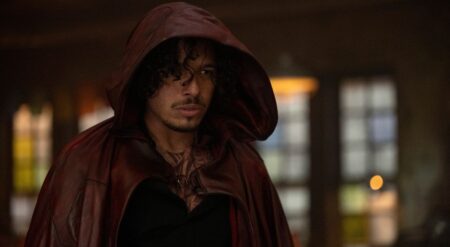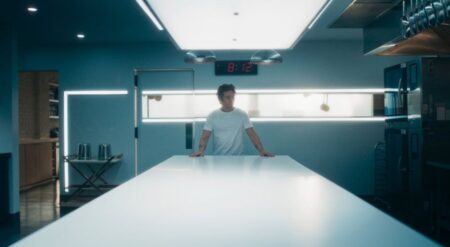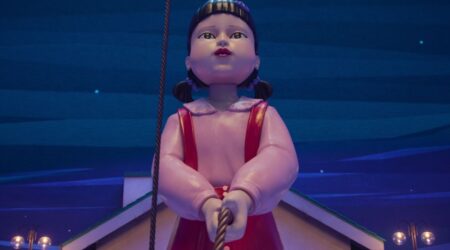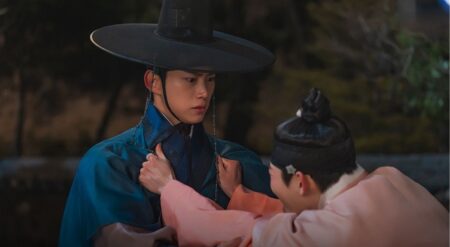
—– Harlots Episode 5 Spoilers Below —–
In Harlots Episode 5, after Hades’ night at the Greek Street house, Margaret Wells and her harlots are poised to be stiff competition for Lydia Quigley.
Margaret Wells: After the successful Hades night, Margaret is feeling at home. Ready to be rid of the fight with Lydia Quigley and armed with new knowledge of the Quigley brothel from Mary Louise, she heads to her rival and confronts her. Margaret calls for a truce. When Dame Death refuses and tells her that she has no place, Margaret asserts that she is underestimated. She points out that Quigley keeps her girls locked in their rooms. Quigley tacitly enters the truce. As she is coming back home, she distributes 1 guieny to each girl as their pay. It’s here when you see Mary Louise, the upper-class dress in stark composition to this kitchen scene, asking for her pay. Margaret, having just paid her debt to Quigley. Harriet Lennox then enters the room, giving her the tip she received from Repton. She asks Margaret to give her the same deal. Only, instead of paying a debt, she would buy her children’s freedom. Margaret agrees.
Lydia Quigley: Up until the point, Dame Death has psychologically harmed her girls, refusing the food or handing them over to their abusers. This, in many ways, is how a female villain is often portrayed. In this episode, it turns. Much how in Episode 3 Lucy sees Repton back-hand his wife, we see her do this to Emily Lacey. Quigley begins to beat Emily after she calls after Ms. Wells as she’s leaving the property after the settling of Mary Lousie’s debt. Hitting and kicking her, and when her son Charles attempts to stop it, she hits him too, immediately apologizing, as he runs away. Where have we seen this before? To me, this is a conscious effort to show the way violence can be done by women in power in the same fashion as a man. In many fight scenes between a male-antagonist and the protagonist (or side character), there is often a moment when the female in the story attempts to separate them and is injured. It’s the turning point when you begin to see real villainy. For Quigley, it solidifies the fact that her harlots are property. Nothing more. As we know after the last episode, she has been “acquiring” (read kidnapping pimp) virgin girls from town to offer to the Spartans, a secret society of powerful men, in exchange for money. After the last episode we see Quigley leverage her talent to gain the knowledge of who them men partaking in these sadist acts are, thereby securing her position in society and as the leading brothel in London. On an altercation with the judge who has been the contact requesting the girls, she realizes that she has all the power in the transaction as he is desperate for “offerings” and he has no names to give Dame Death because he has no idea who the ones in power are, as the outed Spartan Lord Fallon begins to take center stage this episode, we’ll see where this goes.
Emily Lacy: After being beaten by Dame Death, Emily is locked in her room. When she is visited by Charles Quigley, a man who is more concerned by his small bruise instead of her entirely mangled face yet claims to love her, we can see that she is no longer willing to entertain his infatuation. As he drinks more wine, he says that he isn’t drunk, but is instead of feeling the effects of a drug used to soother his pain. When he offers it to Emily, she agrees. She distracts him, pour the entire vile into the wine and then gives it to him. She lays with him in bed until he is knocked out, if it weren’t for faint wheezing that the audience hears, it is easy to assume that he is dead. Emily, I think, was hoping that he was. She searches for his keys and flees the house. She first goes to the Wells’ house and is turned away. Although the women tell Margaret to let her in, she won’t, not because she doesn’t feel Emily, but because she was betrayed. She gives Emily some money and tells her to keep her wits about her. As she wanders the streets, Nancy (WHO I NEED MORE OF NOW!), another madame and a very good friend of Margaret, offers her refuge. Saying that the man deserves worse, however, she is not surprised and does not ask, it seems certain that the violence against the harlots is common. She says it was Quigley and refuses her kindness and instead walks through the street, in the tavern, and keeps trying to proposition clients, all of which ignore her. Her story ends this episode as she sees her reflection in the mirror, battered and bruised and seeks out Nancy, realizing that she can not be on her own.
Lucy Wells: Again, it is made clear that whoring is not a job that Lucy is good at nor one that she wants. As Margaret still seeks a patron for her daughter, we learn that Lord Fallon – who Lucy wooed much to the fear the audience felt after it is revealed that he is one of the sadistic men buying young girls from Quigley – is highly interested in meeting with Lucy. Although Lucy doesn’t have much to do in this episode, we see her interact with Fallon, and he is, for lack of a better word creepy. When they are finally alone, Lucy offers him some port and he responds with a line that sounded kind of sexy at first “I’d rather eat.” As he cuts a pomegranate, he equates Lucy to the goddess Persephone, who was doomed by her mother to live in the underworld as Hades’ bride. He begins feeding Lucy seeds, at first it’s sensual and then it becomes forceful, leading a scarred Lucy to force him off of her and slam against the wall. He laughs. After their encounter, we see Fallon tell Ms. Wells that he will take her and pay a very high price which will be sealed by a contract. When she goes to congratulate Lucy on finding a good house and a patron who can provide her the lifestyle of a highborn lady, her daughter immediately apologizes for the encounter – unaware that he has asked for her. When it is revealed that he is to be her patron, Lucy begs her mother to let her leave this life, to do something else, or at least refuse him. Margaret asks: Did he hurt you? Lucy replies: No, he fed me seeds. As he did not harm her, Margaret sees it as a fair deal and one that will propel her daughter out of poverty and into a higher station.
Charlotte Wells: This is a big episode for Charlotte, and for the season in general. Up until this point, we have seen the women, by-and-large assert their power through sex. Having walked in on her sister with her patron, and Sir George becoming increasingly controlling, the free-spirit Charlotte meets the male “pet” of Repton’s wife. A man, but a harlot none-the-less. We’ve seen him in passing before, in episode one he takes her home and she establishes that he is a harlot like her. He is smitten with her and offers to go away with her to America. He says they should be their own masters. Just when it seems Harlots is about to have a get-away love saving Charlotte from a life of flesh-peddling, she says yes, “we should be our own masters” and leaves without him, set on leaving the patronage of George. Last episode she had sex with Haxby, the man-servant to George and as she is leaving he is attempting to have her say. She tells him that he is lucky that he had her for free since even Sir George pays for it dearly. George is in the doorway and fires Haxby. Charlotte uses her wit to strike verbal blows at George’s ego as she attempts to pack but she doesn’t leave. He approaches Charlotte, pins her down, and rapes her. When he is finished, he forces her to go to a party, as his proxy-wife. Known for her quick-wit, as well as using it against George, the lady of the house tells Charlotte that she would like to hear it.
Charlotte has been quiet and timid since entering the house, George take credit for this. Saying that he has corrected her and that she is agreeable now. He continues to brag about her silence and her new docile nature, showcasing the power he has over her to his fellow noblemen. In this scene, Harlots makes a statement: rape is not about sex. We have seen George have sex many times with Charlotte and as her patron, the exchange of a kept life for sex is the agreement. But this does not mean that Charlotte can not be raped. In a period drama, the show-runners make a statement that needs to be made: sex workers can be victims of rape, their station in society and class does not mean that their brutalization is okay. They do this by Charlotte speaking up. At first she makes her usual jokes, but then, she tell George to tell the table how he tamed her. When he tells her to stop, she firmly says or what, he will hit her again, he will rape her again. Although there is reporting of the action, the room changes and the lady of the house moves her guests out of the dining room, trying to move from the cruel air in the room. As Harlots continues to navigates positions of power and how these women are subjects to it or actors (or in some cases both), Charlotte’s rape is important to spotlight shown on the reality of rape, that it is not sex, it is not about sex, it is how an insecure man (in this case) abuses a woman (in this case) to reassure his position and power.
Amelia Scanwell: In order to end a lighter note, but still a strong one, the character of Amelia Scanwell is being written into her own. Until last episode, she is a shadow of her mother Florence, guiding her in her blindness, and supporting her silently in her fire and brimstone preaching outside the Greek Street house of Margaret Wells. In this episode, we see her interact with her ailing mother. Too sick to preach, she instructs Amelia to go unto the harlots and tell them that the putrid sin will not be washed from their flesh from the moment they sell their body. That no amount penance would save them. Amelia agrees and head out to preach “against” the working women. But her preaching is far different from her mother’s sermons. Where her mother offers Hell, Amelia offers penance. As the camera pans to her, she is speaking (not yelling as her mother does) of how it is never too late to seek forgiveness, God is open to all who seek him. Then, she spots Violet Cross walking with a client. She stops her, “If it’s for money, I have it.” Violet leaves John and takes a pouch from Amelia.
They go to the tavern and when she is confronted by the male-harlot (the spy for Quigley, if you know his name please comment, I haven’t been able to catch it) who says that he isn’t sure if he should inform Violet that the Scanwells work for Quigley or if he should tell Florence that her daughter is in the pocket of a harlot. Violet confronts him, asking if he is bothering Amelia, she responds that he isn’t but that she is thanking him for taking over the preaching duties for her mother the night of the Hades masquerade since she is ill and for helping her. Amelia leaves. In the next scene, she is with her mother, who is in bad shape and even worse with worry. When she is questioned, she tells her mother that she was with the harlots as she said. Her mother responds that she is not to preach to them because they will abuse her compassion to corrupt her. She then has her read a passage from the bible: “For the lips of a strange woman drop as a honeycomb, and her mouth is smoother than oil: But her end is bitter as wormwood, sharp as a two-edged sword. Her feet go down to death; her steps take hold on hell (Psalms 5:3)” — this is a slightly different translation but the meaning still stands. Without a doubt, as she reads she is thinking of her kiss with Violet. There is a knock on the door, it’s Violet. She pulls Amelia in for a kiss, and this time, she is not taken off guard, this time she kisses Violet back.
Some of the side moments in Harlots Episode 5: Fanny is pregnant and Margaret and William continue to be the married couple on television.
Harlots Episode 5 was intense. The dynamics of power that I have talked about see to come to a head in this episode. Throughout the hour-long episode, it’s become apparent that the common stereotypes often given female characters are embodied in the men. The men of the Harlots world are shown as being powerful in society, but in their interactions with the women they are often ridiculed for their looks and they act impulsively based on their emotions.
In Harlots Episode 5, the women though, the women embody many different forms of strength. From physically beating someone, resourcefulness, attempted murder, to uplifting other women, owning their own property, and manipulating the men who seek their comfort. They are gendered by their work by they ultimately embody traits associated with male-female characters alike. Beyond this, Harlots has by and large become a show about women helping women and what happens when they refuse to. With just three more episodes left in the season, the plot is thickening.
**All photos courtesy of Hulu. Harlots is available for streaming the first 5 episodes, with new episodes posted every Wednesday on Hulu**






